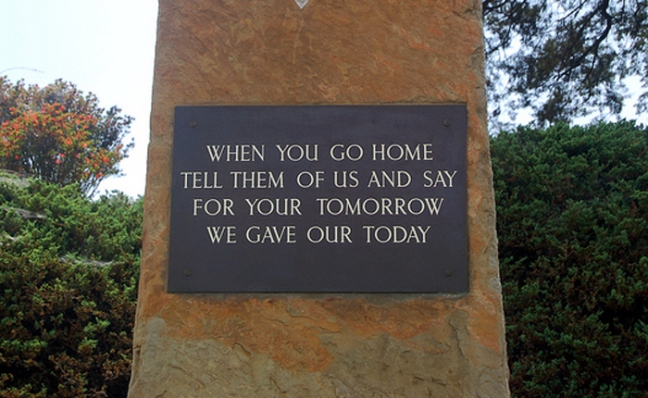This is a re-post of one I wrote last year but I think (even more) relevant for this weekend’s 75th anniversary of the end of the second world war.
******
In the last few weeks we have celebrated and commemorated both the Easter and ANZAC Day holidays (ANZAC Day in Australia and New Zealand being the equivalent of Remembrance Day held on November the 11th in Europe). During this period one topic has regularly come up in conversations in various contexts with friends and family members, particularly those who are parents or who have grandchildren, nephews and nieces etc.
The issue in question is a fearful and deep concern about the future, in particular the trajectory of cultural and moral degradation of society that they see taking place. The particular focus of this concern relates to an anxiety about what sort of society awaits their children and future generations. This matter came to my mind again as I watched the recent ANZAC Day ceremonies, particularly the one at the National War Memorial in Canberra.
ANZAC Day is a very important day in the Australian calendar, a day to remember and give thanks for those who fought totalitarian evils in the wars, particularly the world wars, of the last century, and sacrificed themselves in so many ways that we might be free. On such a day I am always reminded of the poignant inscription written on the ‘Kohima Epitaph’ carved on the Memorial in the cemetery at Kohima in North-East India for the members of the 2nd British Division who fell in the Battle of Kohima in 1944.
‘When you Go Home, Tell Them Of Us And Say,
For Your Tomorrow, We Gave Our Today”
It is a day on which the gratitude is clothed in a sadness, a sadness for those who never came home and those who did but whose lives were permanently damaged by their wounds, physical and emotional. The earthly remains of two of my great uncles lie in some unknown location in the World War One battlefields of Northern France. Their brother, my Grandfather, was invalided out, because of gunshot wounds from which he never fully recovered and my father, a Dunkirk and El Alamein veteran, while not physically wounded, suffered the rest of his life with what is now called Post Traumatic Stress Disorder.
However, as I watched the ANZAC commemorations there was a ‘Deeper Sadness’ still, for the ‘Tomorrow’ we live in is not the ‘Tomorrow’ for which they gave their ‘Today’.
They fought for a society, a way of life marked by characteristics of service, sacrifice, obligation, self-denial, decency and mutually supportive community. Fundamentally, they fought to protect a Christianized society still shaped by a Christian world view with a biblically shaped moral guidance system.
They did not fight for, nor could they have even imagined, the society we have today, one marked by self-centredness, a culture of entitlement, ‘what’s in it for me’ voter intentions, a community destroying, tribalistic, cultural mosaic riven and driven by identity politics. Indeed, it can be argued that what they fought for at enormous cost has now to a great degree been lost.
Then as I watched the ceremonies from various locations a second thought arose. This was, according to the last census, that only about half the participants would make any claim to be Christian, despite the residual veneer of Christianity seeming to be mandatory in ANZAC Day services with prayers and Christian hymns inserted at intervals.
Further, most of these would be highly nominal for, as I wrote in my last post, two thirds of them couldn’t even be bothered to turn up to an Easter service. Such nominalism wouldn’t believe or even understand the meaning of the hymns sung, for example what it means to be the ‘lost’ in a lustily sung ‘Amazing Grace’ , unlike a hundred years ago when those who not only sang but believed in the words of Henry Lyte’s great hymnal prayer ‘Abide with me’ as they perished on the sinking Titanic.
Noticably , there were many children taking part in the marches and present at the ceremonies. Children who increasingly have no concept of the biblical ethos that underlay the ‘Tomorrow’ our forebears sacrificed for, but which is rapidly disappearing, indeed has already virtually disappeared from the homes, schools and universities, the places that are the major influences in their lives.
Yes, ANAC day is an important annual event, one that should be preserved and supported for we have much to give thanks for in the sacrifice of those who gave their ‘Today’. However, there is a ‘Deeper Kind of Sadness’ still, for the ‘Today’ they gave has resulted in a ‘Tomorrow’ with little resemblance to the one they fought for. In fact, what has transpired is a society increasingly making parents fearful at the future their children will have to grapple with.
The only thing that will turn this darkening tide is a strong and sustained new missional movement of the gospel. Such a movement must arise from the ashes of the traditional churches, mired as they are in anachronistic and chronically ineffective forms and strategies last effective in the 20th century.
The question for all of us who claim the Christ, who made the greatest sacrifice for us, as their Lord is –
Will we be in it?

Hi Martin. I forgot to let you know that I passed this post on to half a dozen people who value and honour the ANZAC tradition of mateship and supreme sacrifice. 👍🍷😷
*Bob Mitchell*
*“If everyone is thinking alike, then somebody isn’t thinking.” *― George S. Patton
LikeLike
Thanks Bob.
Yes things have been encouraging lately!
Thanks for passing on the ‘Deeper Kind of Sadness Post’ 👍👍👍
LikeLike